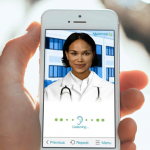 Telemedicine is a topic that I’ve touched on numerous times on this blog over the past year or so, with a number of platforms emerging to offer patients the opportunity to consult with a medical professional from anywhere in the world.
Telemedicine is a topic that I’ve touched on numerous times on this blog over the past year or so, with a number of platforms emerging to offer patients the opportunity to consult with a medical professional from anywhere in the world.
Most of these platforms are clinical based, such as the Babylon service, and therefore provide you with access to doctors when you have something wrong with you.
There are however, also a number that are taking a more preventative approach and seek to keep you healthier in the first place. For instance, last autumn I wrote about the Vida platform that is providing coaching and support to ensure you stay out of the emergency room altogether.
Of course, all of these services require a human healthcare professional at the other end of your video call to answer your queries for you.
Sense.ly are taking another approach by offering an AI based nurse, called Molly, who aims to provide help and support in those periods between appointments with real life professionals.
The service is aimed specifically at patients with common medical conditions such as diabetes or heart failure. The patient signs up to the site either direct or via their GP, and the platform then draws up a personalized care plan for them based upon both their medical records and the individual needs of the patient.
The patient then follows this prescribed plan (hopefully), with regular check-ins with the virtual nurse via their smartphone or computer to help their progress.
Doctors can also access information via the site to see how their patient is getting on, whilst the system will alert them automatically if worrying symptoms begin to emerge.
I’ve written previously about the important role the appearance of avatars has on how we engage with them, so Molly has been designed with a friendly face and a softly spoken voice.
She interacts with patients using voice recognition technology and can ask relatively simple questions of the patient whilst guiding them through exercise plans and collecting medical data from them.
This data can then be analyzed by a doctor (although AI analysis seems inevitable), whilst the patient can also use Molly as a sort of health PA and book appointments with their doctor through her.
With voice recognition technology growing at an incredible pace and the AI grunt of services such as Watson increasingly capable of making complex decisions, this seems the beginning of an inevitable trend towards more automated healthcare.
Check out the video below that explains more about Molly and the service she offers.
Haha, that's pretty darn cool. Like it.
Goodness, whatever next?
Absolutely brilliant. Fantastic idea.
Interesting approach, although it appears to take the patient out of any of the process, in terms of creating the care plan at least. I'm not sure that's wise.
My initial gut instinct is one of extreme scepticism about something like this. But the more I think about it, and the increasing burdens on the NHS here in the UK, then I guess it has the potential to greatly cut costs if done well. But therein lies the problem… the devil will be in the detail. I would worry about the patients that, for whatever reason, it doesn't accurately pick up on, or conversely the patients who are led to unncessarily alarming conclusions about their ailments. No doubt it could factor in future healthcare but there's probably a lot of progress and perfection to be made before it truly 'gets there'.
And there have been studies highlighting that we're much more forgiving of human errors than we are automated ones, which while slightly irrational, it does highlight some of the challenges these technologies have to overcome.
I was really excited about this new idea at first, but can't stop wondering about the back-end usage. How will we make sure Doctors actually do go in and check up on their patients? Will they spend the same amount of time required to help the "virtual" patients as they do with the in-person ones? Will this increase their workload, or decrease it based on less and less physical visits? I think the concept is awesome, but I'm curious to see how well it performs in the real world. There is a lot of strain in the US based on healthcare being a mandatory item nowadays. Doctors, nurses and nurse practitioners are already feeling the effects of increased visits and patient counts. Definitely a controversial topic, but I'm really interested to see how it all plays out!
Hmmm, not sure how this concept would fly here in Canada, where health care is universal and free, at least in theory. I don't have a regular doctor for myself, nor my kids, just like 38% of the population in Quebec, so I personally would love an app like this one. Any technology that can better our health conditions while respecting our privacy is no-brainer, for me. But I can certainly some resistance to change, specially within the medical sphere…
The only constant is that people will resist change 🙂